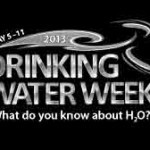The theme of this year’s Drinking Water Week is: What Do You Know About Your H2O? For many Americans, the answer to that question is not much, but it’s never too late to learn and it’s the goal of Drinking Water Week.
 Created 35 years ago by the American Water Works Association (AWWA), Drinking Water Week is a public awareness campaign that encourages consumers to think about their sources of drinking water, how they use it and how to protect it in the future. In the U.S., utilities that provide drinking water to communities are required to monitor and test it for contaminants multiple times each day and provide customers with water quality reports annually. Owners of private wells should havie their water tested periodically by a certified laboratory. Consumers can get information about their drinking water sources form their local utility, the U.S. Environmental Protection Agency’s watershed tool or DrinkTap.org.
Created 35 years ago by the American Water Works Association (AWWA), Drinking Water Week is a public awareness campaign that encourages consumers to think about their sources of drinking water, how they use it and how to protect it in the future. In the U.S., utilities that provide drinking water to communities are required to monitor and test it for contaminants multiple times each day and provide customers with water quality reports annually. Owners of private wells should havie their water tested periodically by a certified laboratory. Consumers can get information about their drinking water sources form their local utility, the U.S. Environmental Protection Agency’s watershed tool or DrinkTap.org.
“We all agree that water is an essential element in our daily lives, but for North Americans water service is a convenience that we too often take for granted until an issue like a main break or boil water notice occurs,” says AWWA Executive Director David LaFrance. “We need to be aware of those issues now and protect against them for the future.”
Current population, economic, energy, climate and pollution trends all affect water usage and the infrastructure, according to the AWWA. “As our systems’ aging pipes are replaced over the next 25 years, addressing this issue may be costly but it’s not insurmountable. Facing it head-on by proactively investing in our water systems now is a smart, safe, common sense investment that will pay off for generations to come.”
The AWWA has several recommendations for maintaining water quality at home. They include: clean faucets and aerators regularly; clean and disinfect sinks and drains regularly; keep drains clear and unclogged; use cold water for drinking and preparing food; replace old plumbing and install certified “lead free” fixtures; flush cold water taps after household plumbing work or when the water hasn’t been used for several days; drain and flush your hot water heater annually; follow the manufacturer’s instructions for the water heater, filters, treatment devices, softeners and any other products attached to the water system; do not connect hoses or other devices intended for non-drinking purposes to household drinking water faucets; keep hazardous chemicals and unsanitary materials away from drinking water faucets.




